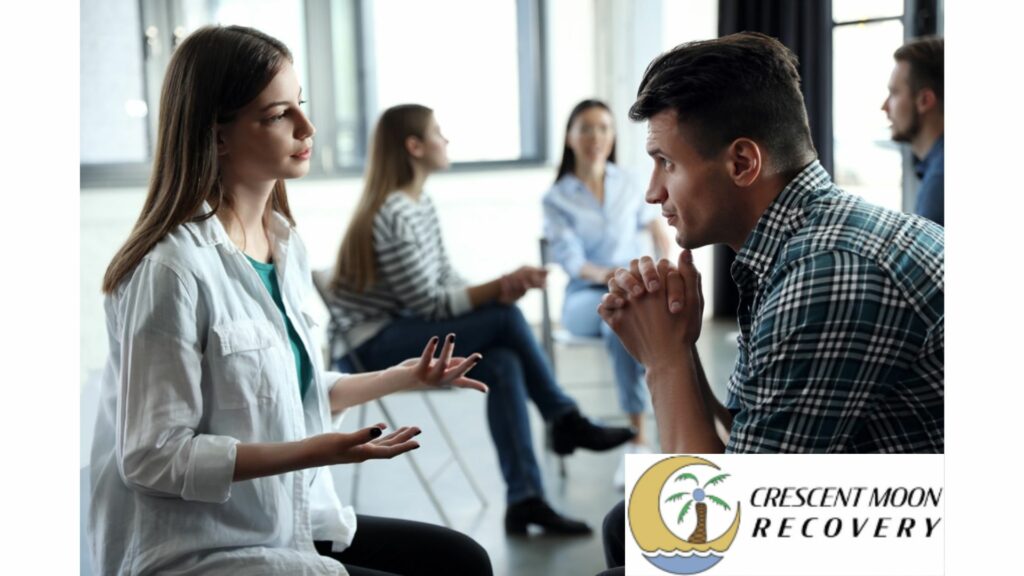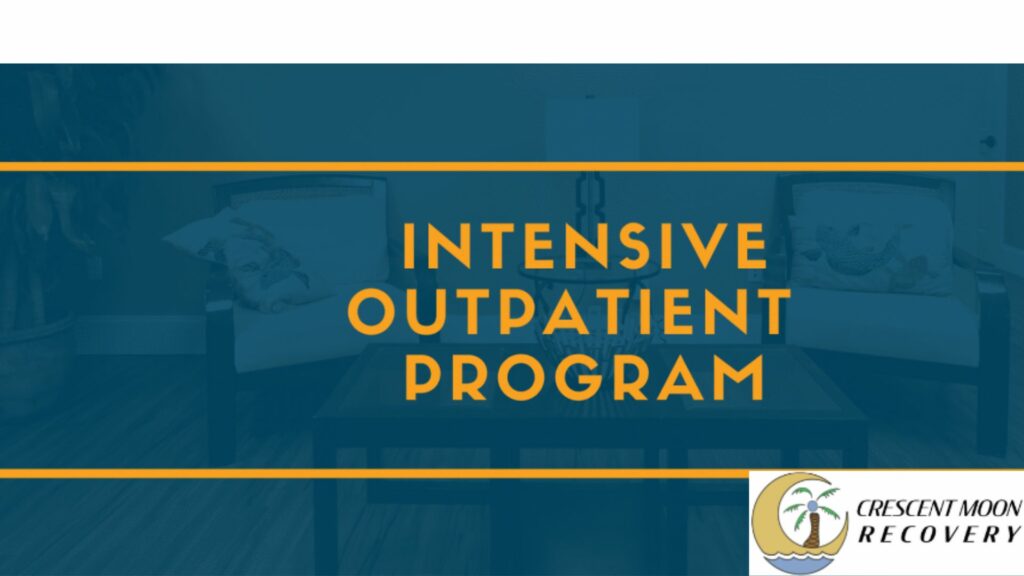
At Crescent Moon Recovery, we understand that recovery from substance use disorder (SUD) or alcohol use disorder (AUD) isn’t just a physical endeavor. Addiction can have negative effects on an individual’s mind, body, and spirit. Each of these areas are in need of healing when undergoing addiction treatment to ensure lasting recovery. Not only are substance abuse disorders classified as a mental health disorder by the National Institute of Mental Health (NIMA), but they also report that about half of individuals who experience SUD also experience co-occurring mental disorders as well.
It is important to us that participants of our treatment programs receive intensive therapy that addresses and treats these disorders and that they do so in a safe, supportive, environment that lacks judgment and encourages growth. Our specialized therapists and professionals can work with you through your diagnoses by educating you and teaching you ways to adapt for easier living in recovery.
Mental health disorders and substance use disorders are often connected and co-occurring. Many people who develop substance use disorders are also diagnosed with mental health disorders, and substance use disorders can also lead to mental health disorders. Co-occurring disorders in addiction are mental health disorders that occur alongside addiction. It is common that the presence of these disorders leads to the misuse of substances because an individual may have never learned healthy coping mechanisms to treat their mental health and may be using drugs or alcohol to self-medicate these symptoms. Co-occurring disorders most commonly seen with addiction include:
The symptoms of these disorders can be incredibly difficult to manage and can even become debilitating if left untreated. This can lead individuals to seek drugs or alcohol in an attempt to self-medicate and treat mental health symptoms. If these symptoms are not diagnosed and monitored by a doctor or medical professional, substance use can quickly become out of control and turn into an addiction. Addictions can cause irreparable damage to a person’s family, work, and relationships. Co-occurring disorders can cause another obstacle in recovery from addiction because they often hinder a person’s ability to think positively.
Using or abusing drugs or alcohol to treat mental health disorders often has adverse effects and can exaggerate the symptoms of co-occurring disorders. Ceasing the use of drugs or alcohol certainly does not make mental health disorders go away. Oftentimes, relapse can happen because of poor coping mechanisms surrounding negative emotions and thought patterns. For this reason, is important that individuals receive help for both addiction and co-occurring disorders to prevent future relapse. This way, they will develop a deeper understanding of themselves and their needs and limitations in recovery. Through therapy, individuals can learn how to communicate boundaries, gain self-confidence, and participate in self-care. These practices are all important to a healthy recovery from both substance use and mental health disorders.
Like addiction, mental health disorders can affect everyone differently. That’s why there are many different treatment options available, even among people with the same diagnosis. Treatment programs vary in length, include many different types of therapy, and may be centered around a specific goal or objective. They will oftentimes incorporate activities like relaxation exercises, individual therapy, and group and family therapy to help individuals gain support and guidance with their diagnosis. Here are some common forms of treatment for mental health disorders:
Like addiction, mental health disorders can be treated through inpatient, outpatient, and partial hospitalization programs. Choosing the right treatment plan for you and your needs is key in achieving long-term recovery.
Located in Fountain Valley, California, a national hub for the recovery community, our recovery center is staffed by a full team committed to your recovery and helping you build you sober life. This includes treating co-occurring disorders. The Southern California climate, local beaches, and mountains make Crescent Moon Recovery a natural place for our clients to engage with our staff and each other, helping them build lasting connections for a sustained recovery. Our professionals are educated in many different co-occurring disorders and how they interact and counteract addiction. With a combination of psychotherapy, group therapy, and CBT, as well as fitness and outdoor activities, Crescent Moon Recovery treats many co-occurring disorders such as:
Treatment for these disorders occurs in conjunction with treating substance use disorder, as they can be a driving factor in an individual’s substance use. Crescent Moon Recovery uses individual psychotherapy, group and family therapy, and cognitive-behavioral therapy to help provide support to our participants throughout their time in our program. During these therapies, participants will become aware of the effects that their mental health has on their desire to use drugs or alcohol and become more educated in both substance use and mental health disorders.

Here at Crescent Moon Recovery, we understand that mental health diagnoses can be incredibly difficult to receive help and understanding for, especially when you feel alone. We are willing to provide a safe, supportive environment for your recovery that encourages you to stay sober and cater to your mental health needs. We can teach you exercises to aid in relaxation and mental health, such as:
Crescent Moon Recovery confidently believes in the power of these evidence-based therapies that have been shown to reduce symptoms of depression, anxiety, and other disorders.
These exercises are often introduced in individual therapy, in which your therapist can provide a relaxing atmosphere free of distractions so you can reach a sense of calm that you may have not experienced for a long time. In these sessions, you will meet with a therapist one-on-one to tackle the more sensitive aspects of your disorder. We understand that not every therapeutic method is going to be effective for each participant’s unique situation, that’s why we incorporate many different forms of therapy, including but not limited to:
Our professionals are not only trained in treating substance abuse disorders but also the co-occurring disorders that can come with them. They are dedicated to helping you find the most comfortable and effective path toward treatment and recovery. Oftentimes, participants may feel discouraged, lack confidence, or have questions surrounding mental health and recovery from substance abuse. Moreover, during the time following sobriety, the effects of mental health disorders can be increasingly difficult to manage. In these times, it can be reassuring to visit a professional who can provide trustworthy insight and offer methods to treat these symptoms that may have never occurred to you.
Choosing the right addiction recovery center is important for achieving your individual goals in recovery. Crescent Moon Recovery’s mission is centered around reinventing lives by treating addiction through evidence-based treatments. We provide both individualized and holistic treatment to begin the process of healing your body, mind, and spirit from the effects of addiction and mental health disorders. The location of our treatment center allows us to use nature to our advantage, and we often take our participants on hikes, horse rides, and surfing on the same days they receive the best individual and group therapies available.
As our participants begin to adjust to sober living, we provide them with coaching in various social areas, such as school or work. We understand that recovery from addiction is not linear and that not every struggle after treatment can be predicted, but we do our best to prepare you when stressful situations arise. Many times, a participant’s education, vocation, and relationships are directly impacted by addiction, and we prioritize getting them on the right track when the time comes.
In terms of healing the body, Crescent Moon Recovery provides its participants access to a nutritionist who can set health and wellness goals, teaching the importance of a healthy diet and regular activity. There is an important connection between feeling well in your body and how it translates to improved mood and energy. Once our participants are feeling better, it allows for them to focus more clearly on their recovery. We have many activity-based therapy sessions that our participants can take advantage of to begin repairing these connections.
Crescent Moon Recovery also has treatment plans that include using a 12-Step approach to maintaining recovery. We also provide transportation to local Narcotics Anonymous (NA), Alcoholics Anonymous (AA), SMART Recovery, and Refuge Recovery meetings for participants and alumni of our programs. These resources can help provide spiritual healing that may have undergone significant damage from substance abuse, as well as providing peer support to promote a lasting recovery.
We are committed to encouraging participants to go to any lengths to living a sober life and are relentless about the importance of having a strong foundation rooted in a community that supports sobriety. Many of our staff at Crescent Moon Recovery also know the personal struggles that come with addiction and mental health disorders. They are available for individual and group therapy and also have an open-door policy to provide additional support.
Participants of Crescent Moon’s Recovery programs have the benefits of the outdoors, accredited therapies provided by caring, invested professionals, as well as a supportive community of peers to spend time and build relationships with. In our care, you can focus on your recovery in a safe environment designed to encourage and celebrate your successes in recovery. You will be held accountable to your commitments by our trained professionals and your peers with compassion and understanding.
You can learn more about Crescent Moon Recovery’s treatment programs by visiting our Programs page.
Co-occurring disorders and substance abuse disorders are closely linked, and the presence of mental health disorders can make recovery even more difficult. It is important that both of these disorders are identified and treated simultaneously for a strong recovery and to prevent relapse. Crescent Moon Recovery can provide help in both areas through many different forms of therapy and holistic treatments that can be personalized to meet your unique needs. Call us today at (714) 464-8474 to learn more and explore treatment options.
© 2024 Crescent Moon Recovery: Alcohol & Drug Rehab Centers Orange County, LLC. All Rights Reserved.